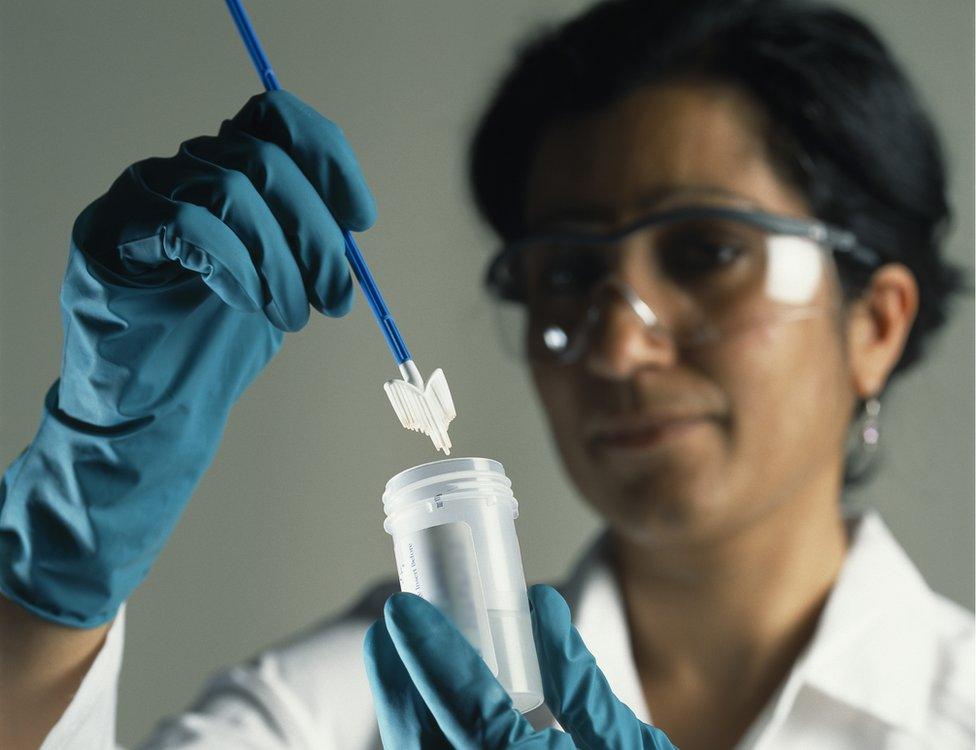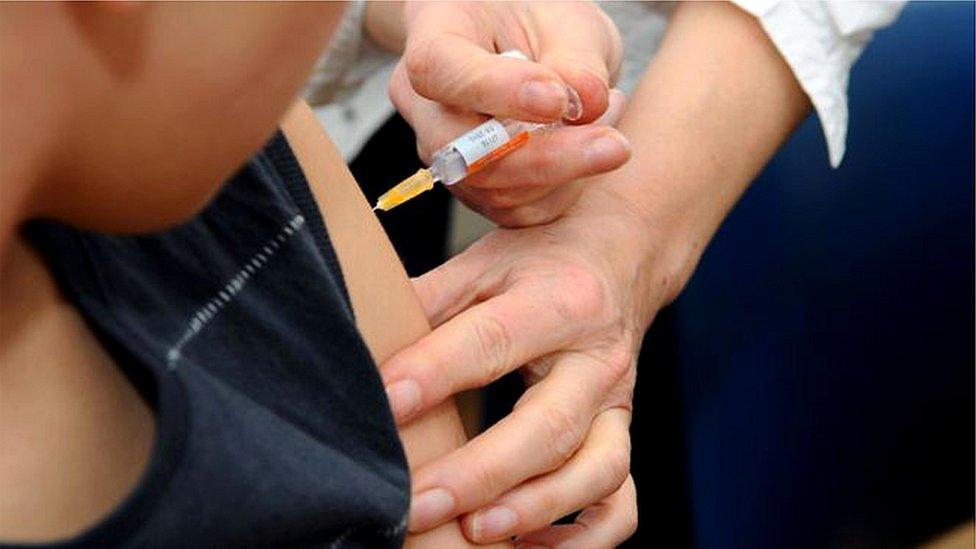One in four women ignores cervical smear test invite
- Published

Uptake of smear tests is low among young women and those from deprived areas
More than one in four women in Scotland eligible to have cervical screening has not taken the test, official figures have shown, external.
The uptake is poorest among young women and those from the most deprived areas.
In Scotland women aged 25-64 are invited for screening each three or five years to detect signs of cervical cancer, the second most common form of the disease among women under 35.
Health experts have called for a new information campaign to improve uptake.
The figures from the Scottish government's Information Services Department show more than a million women (1,030,703) took the test in 2018/19.
Overall, uptake was 73.1%, although women from the most deprived areas were less likely to take part in the screening (67%).
'Keep pushing the message'
It was even lower among young women (61.8%).
The Scottish government's target is for 80% of eligible women to undergo screening.
Linda Bauld, Professor of Public Health at Edinburgh University said the figures showed the need for a new awareness campaign.
She said: "Screening uptake rates fluctuate so we need ongoing campaigns to maintain awareness.
"There was a big increase in uptake after the death of Jade Goody, external 10 years ago.
"But it's vital that the Scottish government keeps pushing the message that many women are still not going for screening."

'I'm here and I put it down to that five-minute test'
'I'm here and I put it down to that five-minute smear test'
In her home in Alexandria by Loch Lomond, 44-year-old Michelle McGinty has got her life back on track after the devastating news that she had cervical cancer.
She resumed a university course, her children are successfully passing college exams and she is expecting her fourth grandchild.
But it could have been so different.
After what she said was a bad smear test when she was 19 and pregnant with her first child, she ignored subsequent invitations to have a repeat.
"It put me off. It was sore, it was uncomfortable. There was no dignity. It was not a nice experience," she said. "Psychologically it put me off and I kept putting the letters to one side."
Michelle later went to the GP on a separate matter and was asked to have a smear test because she had not had one for some time.
Progressed quickly
She agreed because she said she felt cornered - but is glad she did as the results gave doctors cause for concern.
"My cancer progressed very quickly until it got to the stage that I needed a radical hysterectomy," she said.
That operation took place just four months after her first diagnosis.
Michelle is now free of the disease.
"The main thing is I'm here. I'm able to see my kids passing their HNCs, going to college doing HMDs, and a new grandkid being born. And I absolutely put it down to that five-minute test."
She has urged other women to take the test, which she acknowledges has improved considerably since her bad experience 25 years ago.
"It is a silent disease," she said. "Just because you've not got symptoms doesn't mean you don't have cervical cancer.
"And the only way it can be caught early is through screening."

In 2017, 105 women died from cervical cancer in Scotland, external, but over the last 35 years, rates of cervical cancer diagnoses have fallen throughout Europe from 18.6 per 100,000 persons in 1981, to 10.1 in 2017.
The government's information service said this may be partly due to the continued efforts of the cervical screening programme.

Scottish schoolgirls are routinely offered vaccination against HPV which can cause cervical cancer
The Public Health Minister, Joe FitzPatrick said the government had invested in a digital-led campaign to encourage more women to have a smear test.
He explained: "We know that cervical screening can reduce cases of cervical cancer and deaths.
"In total, up to £5m of funding from the cancer strategy is being invested in the screening programmes to encourage those who are eligible to take up their invitation."
Health experts have said routine vaccination of teenage girls against the Human papilomavirus (HPV) introduced in Scottish schools in 2008 was likely to lead to a reduction in cervical cancer rates in the future.
Vaccinations for boys
A team of academics - from Strathclyde, Edinburgh, Aberdeen and Glasgow Caledonian universities - analysed vaccination and screening records for 140,000 women who went for their first cervical screen from 2008-2016.
Their study, published by the British Medical Journal (BMJ), concluded Scotland's HPV vaccination programme had led to "a dramatic reduction in pre-invasive cervical disease".
It said levels of cancer-causing HPV in Scotland have dropped by almost 90% in young women and added the vaccine is "highly effective" and should greatly reduce the incidence of cervical cancer in the future.
The Scottish government announced in July 2018 it was extending the HPV vaccination programme to schoolboys in S1-S3.